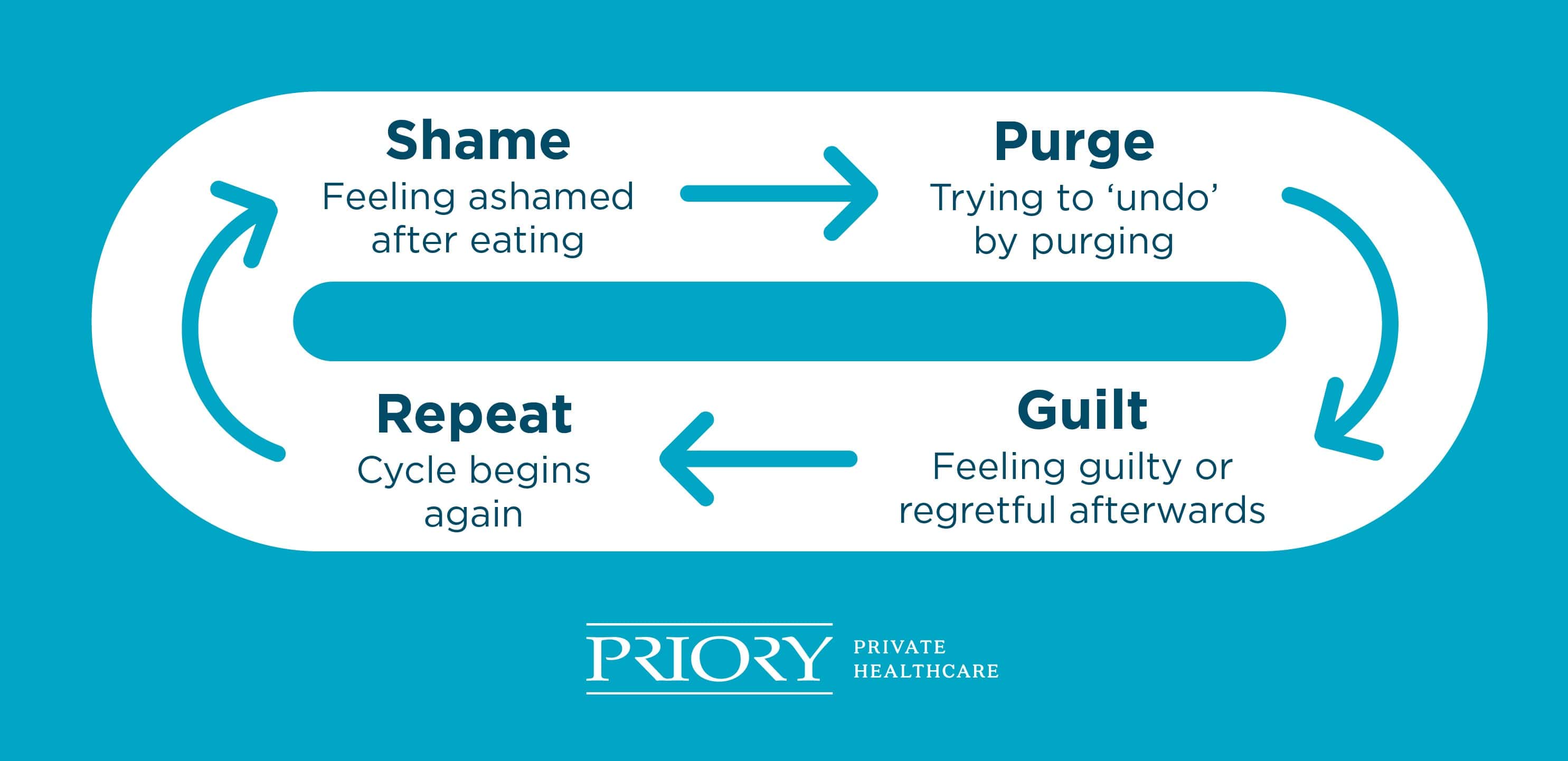Purging is a harmful behaviour that’s often associated with eating disorders. It’s used as a way to try and ‘undo’ or compensate for eating.
Lots of people think of vomiting when they hear the word ‘purging’, but it can also include excessive exercise, fasting for long periods of time after eating, or abusing laxatives, diuretics or enemas.
Purging can be a symptom of lots of different eating disorders - not just bulimia - and it can have a serious impact on your body and mind. If you or someone you care about is engaging in purging, recognising it early is an important step towards getting the right support.
Reach out for confidential help today
Types of purging
Purging isn’t just one behaviour - there are a number of ways someone might try to ‘get rid of’ food and calories. These can include:
- Self-induced vomiting - making yourself sick after eating to try to control your weight or stop your body absorbing calories
- Laxative, diuretic or enema misuse - taking laxatives (to speed up bowel movements), diuretics (to remove fluid through urine) or enemas (to flush out the bowels), when they’re not needed, in an attempt to feel ‘empty’ or lose weight
- Insulin misuse (sometimes called diabulimia) - people with diabetes may skip or reduce their insulin doses to try and lose weight, which can be very dangerous and lead to serious complications
- Excessive or compulsive exercise - exercising for long periods of time or feeling as though you’re unable to stop exercising, often to try and ‘burn off’ calories. You might exercise even when you’re tired, ill or injured
Physical effects of purging on the body
Purging can take a serious toll on your physical health. Over time, these behaviours can affect almost every part of your body:
- Hair and eyes - your hair becomes brittle, dry or falling out more easily. Repeated vomiting can cause the tiny blood vessels in your eyes to burst, and purging behaviours can lead to a tired, sunken appearance
- Teeth and mouth - stomach acid from vomiting can wear down your tooth enamel, damage your gums and cause mouth ulcers. It can also make your salivary glands swell, which can lead to puffiness around your cheeks and jaw
- Heart and kidneys - purging often leads to dehydration and an imbalance in important minerals in the body. This can put your heart under serious strain and affect how well your kidneys work
- Skin - your skin might become dry and more prone to bruising. You might also get rough patches or calluses on your knuckles, especially if you make yourself sick by placing your fingers at the back of your throat, as this can cause the backs of your hands to rub against your teeth
- Reproductive system - hormonal imbalances caused by purging can affects periods, reduce fertility and lead to complications during pregnancy
- Brain and mood - purging can also take a toll on your mental health. It’s common to experience depression, anxiety, mood swings and trauma symptoms, as a result of purging
Not sure if it’s purging? Take our free online eating disorder test
Warning signs of purging
If you’re worried that you or someone you care about might be purging, there are a few behavioural and physical signs to look out for:
- Frequent trips to the bathroom after meals, often to be sick
- Becoming fixated on weight, calories or body shape
- Using laxatives, diet pills or exercising excessively to ‘make up’ for eating
- Dental problems like tooth sensitivity, as well as scars on the hands and swollen cheeks
- Withdrawing from loved ones, mood swings and becoming more irritable than usual
Not everyone will show all these signs, but spotting even a few may suggest someone is struggling and could benefit from support.
Mental health and emotional impact
Purging is often about more than just food - it’s closely linked with emotional distress and mental health difficulties. Many people who purge also live with conditions like depression, anxiety or trauma, and use purging as a way to cope with overwhelming feelings or regain a sense of control.
Emotionally, purging can become part of a difficult cycle. A person might feel shame or distress after eating, then purge to relieve those feelings. But this is often followed by guilt or self-criticism, which then leads to the behaviour happening again.

This cycle can be incredibly isolating. People who purge often try to hide their behaviour, keeping it secret from friends and family. Over time, this internal struggle can increase feelings of loneliness and low self-worth.
It's important to know that support is available and recovery is possible with the right help.
Is purging a mental illness?
Purging on its own isn’t a mental illness but it’s a serious symptom of an eating disorder. It’s most commonly linked to bulimia, but can also be part of other conditions like anorexia, binge eating disorder (BED) or other specified feeding or eating disorders (OSFED).
In each case, purging is usually a response to deep emotional distress and often co-exists with other mental health difficulties. That’s why it’s so important to recognise purging behaviours early. The sooner someone gets support, the easier it is to break the cycle and prevent lasting damage.
Getting help for purging
If you or someone you care about is struggling with purging, it’s important to know that help is available and recovery is truly possible.
When you’re caught in the cycle of purging, it can be hard to imagine things ever feeling different. But with the right support, many of the physical effects can be reversed, and emotional healing is absolutely achievable.
At Priory, we take a whole-person approach, helping you understand what’s driving the behaviour and giving you the tools to build a healthier, more balanced life. Therapy can support you to rebuild self-worth, confidence and hope for the future.
We offer a range of evidence-based treatment options tailored to your needs, including:
- Inpatient or residential care - for people needing more intensive, round-the-clock support in a safe and structured environment
- Outpatient and day care programmes - flexible support that fits around your daily life, with regular sessions to build healthier coping strategies
- Nutritional counselling - helping you rebuild a balanced relationship with food, guided by experienced dietitians who understand eating disorders
- Psychological therapies - including cognitive behavioural therapy (CBT), dialectical behaviour therapy (DBT) and trauma-focused therapies, to explore the emotional drivers behind purging and support long-term recovery
As former patient Callum shared:
“I’ve loved the journey. The change in me has been immense. All the therapists are absolutely amazing. It’s really motivated me to get on with my life and excited me about the rest of my life.”







